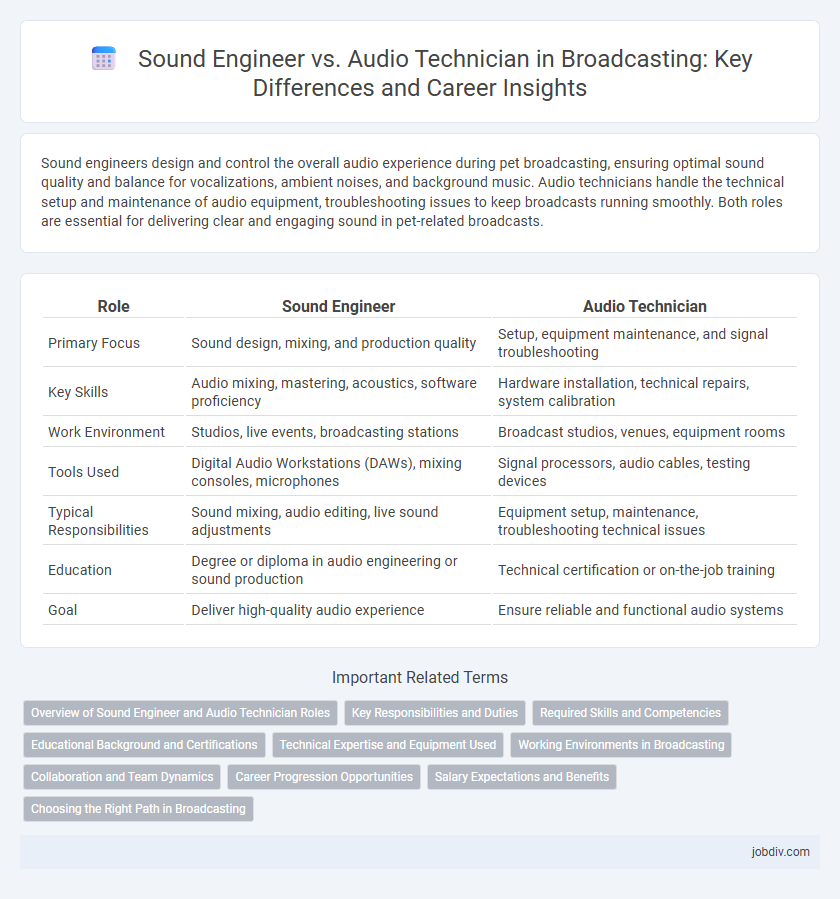Sound engineers design and control the overall audio experience during pet broadcasting, ensuring optimal sound quality and balance for vocalizations, ambient noises, and background music. Audio technicians handle the technical setup and maintenance of audio equipment, troubleshooting issues to keep broadcasts running smoothly. Both roles are essential for delivering clear and engaging sound in pet-related broadcasts.
Table of Comparison
| Role | Sound Engineer | Audio Technician |
|---|---|---|
| Primary Focus | Sound design, mixing, and production quality | Setup, equipment maintenance, and signal troubleshooting |
| Key Skills | Audio mixing, mastering, acoustics, software proficiency | Hardware installation, technical repairs, system calibration |
| Work Environment | Studios, live events, broadcasting stations | Broadcast studios, venues, equipment rooms |
| Tools Used | Digital Audio Workstations (DAWs), mixing consoles, microphones | Signal processors, audio cables, testing devices |
| Typical Responsibilities | Sound mixing, audio editing, live sound adjustments | Equipment setup, maintenance, troubleshooting technical issues |
| Education | Degree or diploma in audio engineering or sound production | Technical certification or on-the-job training |
| Goal | Deliver high-quality audio experience | Ensure reliable and functional audio systems |
Overview of Sound Engineer and Audio Technician Roles
Sound engineers manage the technical aspects of audio recording, mixing, and reproduction, ensuring sound quality meets professional standards during live broadcasts and studio productions. Audio technicians focus on setting up, operating, and maintaining audio equipment such as microphones, amplifiers, and soundboards to support the smooth execution of broadcasts. Both roles require technical expertise but differ in scope, with sound engineers emphasizing creative control and audio technicians concentrating on equipment operation and maintenance.
Key Responsibilities and Duties
Sound engineers manage the technical aspects of audio production, including mixing, recording, and mastering sound for television, radio, and live broadcasts to ensure optimal audio quality. Audio technicians primarily handle the setup, maintenance, and troubleshooting of audio equipment such as microphones, mixing consoles, and speakers during live events or studio sessions. Both roles require expertise in signal flow, acoustics, and equipment operation, but sound engineers focus more on creative control while audio technicians emphasize technical support and equipment reliability.
Required Skills and Competencies
Sound engineers require advanced knowledge of audio signal flow, mixing consoles, and acoustic principles to manipulate and enhance live or recorded sound effectively. Audio technicians need proficiency in setting up, operating, and maintaining audio equipment, with strong troubleshooting skills to ensure seamless broadcast operations. Both roles demand attention to detail, technical aptitude, and the ability to collaborate with production teams in high-pressure environments.
Educational Background and Certifications
Sound engineers typically hold a bachelor's degree in audio engineering, music production, or a related field, providing a strong foundation in acoustics, signal processing, and studio technology. Audio technicians often acquire certifications such as Avid Pro Tools, Certified Technology Specialist (CTS), or training from technical schools focusing on equipment operation and maintenance. Both career paths benefit from hands-on experience, but sound engineers usually pursue more extensive formal education, while audio technicians emphasize specialized certifications.
Technical Expertise and Equipment Used
Sound engineers specialize in managing complex audio systems, using advanced mixing consoles, digital audio workstations (DAWs), and signal processors to achieve precise sound quality in live broadcasts and studio recordings. Audio technicians handle the setup, maintenance, and operation of audio equipment such as microphones, amplifiers, and soundboards, ensuring seamless playback and sound capture during broadcasts. Both roles require technical expertise, but sound engineers focus more on audio manipulation and creative mixing, while audio technicians prioritize equipment functionality and troubleshooting.
Working Environments in Broadcasting
Sound engineers in broadcasting typically work in controlled studio environments, managing complex audio mixing consoles and ensuring optimal sound quality for live or recorded content. Audio technicians often operate in more varied settings, including on-location shoots, live events, and outside broadcasts, handling microphone setup, signal routing, and troubleshooting equipment. Both roles require expertise in audio signal flow but differ significantly in their working environments, with sound engineers favoring fixed studios and audio technicians adapting to dynamic, sometimes unpredictable locations.
Collaboration and Team Dynamics
Sound engineers and audio technicians play distinct yet complementary roles in broadcasting, ensuring seamless audio quality through effective collaboration. Sound engineers design and manage complex audio setups while audio technicians handle equipment operation and maintenance, fostering a dynamic team environment. Their coordinated efforts optimize sound production, enhance live broadcasts, and resolve technical issues promptly.
Career Progression Opportunities
Sound engineers typically advance to senior positions such as chief engineer or technical director, leveraging expertise in audio mixing, system design, and live event management. Audio technicians often progress by gaining specialized skills in equipment maintenance, sound installation, and troubleshooting, potentially moving into supervisory or technical support roles. Career growth in broadcasting favors sound engineers who demonstrate proficiency in digital audio workstations and complex broadcast signal flow.
Salary Expectations and Benefits
Sound engineers typically earn higher salaries than audio technicians due to their advanced technical skills and responsibilities in managing complex audio systems during broadcasts. According to the Bureau of Labor Statistics, sound engineers have a median annual wage of approximately $55,000, whereas audio technicians average around $40,000. Benefits for sound engineers often include health insurance, retirement plans, and opportunities for overtime pay, reflecting their specialized expertise in live and recorded sound environments.
Choosing the Right Path in Broadcasting
Sound engineers specialize in recording, mixing, and mastering audio to create high-quality soundscapes in broadcasting, while audio technicians handle equipment setup, maintenance, and live sound adjustments. Choosing the right path depends on your interest in technical equipment management versus creative audio production. Understanding industry demands and pursuing certifications like Avid Pro Tools for sound engineers or AVIXA CTS for audio technicians can enhance career prospects in broadcasting.
Sound Engineer vs Audio Technician Infographic

 jobdiv.com
jobdiv.com